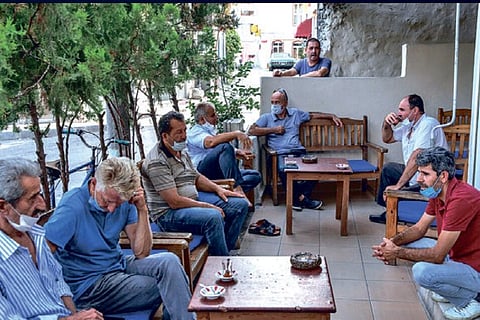

Chennai
“Every day I used to come here,” said Suzme, 77, a retired textile salesman. “This is our second home. It’s a place I love, I see my friends, and I am happy and I play games.” Until the pandemic. A lockdown earlier this year closed coffeehouses across the country, along with bars and restaurants, and when the government allowed them to reopen in June, it forbade the usual games, saying they increased the risk of viral transmission. Customers, who are mostly middle-aged and retired, stopped coming for fear of the virus, and with games banned, coffeehouse owners saw business dwindle. Even before another lockdown took effect this month, they had been worried that the coronavirus could endanger the survival of many coffeehouses, robbing the country of an essential hub of Turkish life.
A uniquely male preserve, the Turkish coffeehouse is everything from a post office to a social club, fuelled by cups of coffee — or these days, as tastes change, tea. In every neighbourhood, from Istanbul’s narrow back alleys to the ancient towns spread across the country, it is where men stop on the way to and from work, pensioners meet up and swap gossip, and political parties campaign.
“We miss our friends and playing backgammon,” said Mamuk Katikoy, 70, when he recently came by the Kiral Coffeehouse in the Istanbul neighbourhood of Yesilkoy for an interview. “I haven’t seen this man for eight months,” he said, greeting a 90-year-old friend who also stopped by.
Several coffee shop owners complained that President Recep Tayyip Erdogan’s religiously conservative government was opposed to the games because of their association with gambling, and that the ban was more ideological than hygiene related. The country was already in an economic downturn when the pandemic hit, and with government help scarce, many businesses have been forced to close for good. Several famous cafes in the artistic neighbourhood of Beyoglu have shut down in recent months.
They had introduced Italian espresso to Istanbul society — Simdi Cafe, now closed, was famous for its 1960s-era espresso machine — and came to represent a flowering of Turkey’s intellectual and artistic life.
The traditional Turkish coffeehouse is a more humble affair, where the regulars are mainly working-class people, playing cards, backgammon and okey, a game similar to rummy, played with numbered tiles. Some coffeehouses charge for running games by the hour, while others just make their money from the drinks they serve.
But without games, business between lockdowns was so poor that most coffeehouses closed or have few patrons. Owners warn that without more government aid they may have to close permanently. “Our businesses are empty,” said Murat Agaoglu, the head of the Turkey Coffee Houses and Buffets Federation, who predicted that 20 per cent of country’s coffeehouses would go out of business.
That could rob Turkey of a mainstay of its communities that is almost as old as coffee drinking itself. A flyer on the wall in the Kiral Coffeehouse reads: “We ask the government, don’t we matter to you?” Kiral said he would be heartbroken to lose the business.
Carlotta Gall is the Istanbul bureau chief, covering Turkey for NYT©2020
The New York Times
Visit news.dtnext.in to explore our interactive epaper!
Download the DT Next app for more exciting features!
Click here for iOS
Click here for Android